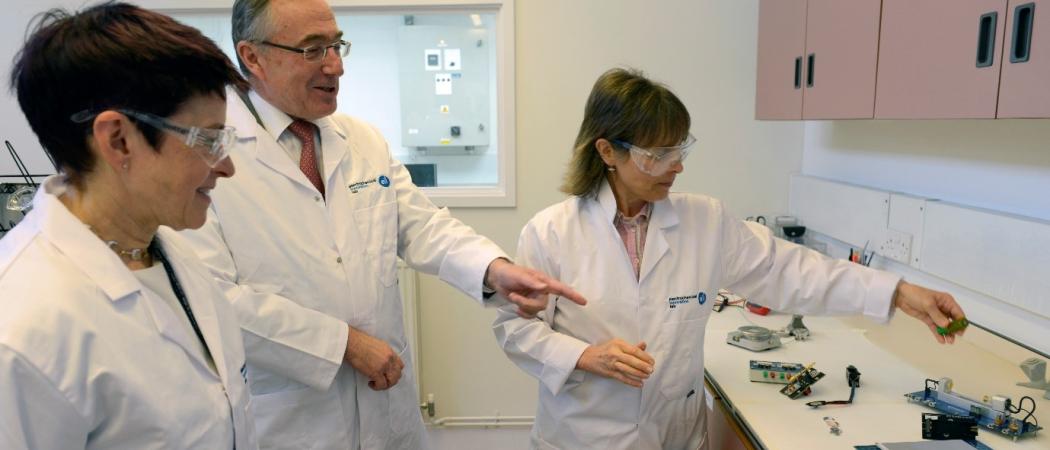
Dr Celia Caulcott, UCL Vice-Provost (Enterprise), UCL President & Provost, Professor Michael Arthur open the new UCL Faraday Laboratory. Credit: UCL.
Engineers and chemists will focus on researching and developing the batteries of the future, helping to accelerate the world's electric vehicle revolution in the newly opened UCL Faraday Laboratory.
Launched this week by UCL President & Provost, Professor Michael Arthur, the new state-of-the-art facilities on UCL’s Bloomsbury campus will enable researchers to develop technologies for the electrification of vehicles as part of a £78 million government-backed initiative.
Transport is responsible for roughly a quarter of the EU’s greenhouse gas emissions and with ever-increasing concern and realisation of the consequences of climate change, decarbonising the transport sector is an imperative.
While the remarkable properties of lithium-ion batteries have revolutionised consumer electronics and realised practical electric vehicles, much more research and development is needed to advance battery technology in order to deliver on the cost, performance and safety required for wide-scale adoption.
"As the driver of an electric car myself, I am a believer in the technology and need to electrify the transport sector. UCL is proud to be a founding university of the Faraday Institution and through the recruitment of five new academic staff in this field and new facilities at the UCL Faraday Laboratory, we look forward to finding real-world solutions to the energy problems facing humanity,” said Professor Arthur.
UCL is one of seven universities which founded the Faraday Institution (FI), the fundamental science arm of the Industrial Strategy Challenge Fund Faraday Battery Challenge. Together with its partners, UCL is doing world-leading research into electrochemical power systems.
The research projects in the new lab, which are all funded by FI, focus on discovering materials for batteries with improved cost, capacity and safety; developing new ways of fabricating and scaling-up batteries and understanding how batteries operate and performing through advanced characterisation and diagnostic techniques to help us understand the key degradation and safety challenges.
Professor Nigel Titchener-Hooker, Dean of UCL Engineering, said: “We are entering the age of electrochemical power – through the UCL Faraday Laboratory and our investment in the Advanced Propulsion Lab at UCL East, UCL is making a long-term commitment to this exciting and important technology.”
Professor Ivan Parkin, Dean of UCL Mathematical & Physical Sciences and Chair of the Faraday@UCL Committee, said: “A key tenet of the Faraday Institution is to train the next wave of talented researchers to tackle the challenges of vehicle electrification and we are working with the FI to realise their training, diversity and inclusivity targets. The new facilities provide a multidisciplinary environment where scientists and engineers work together and undergraduates rub elbows and learn from leading researchers in the field.”
Neil Morris, CEO of the Faraday Institution, said: “We are delighted that the Faraday Lab at UCL is up and running, enhancing the facilities already available to the thriving battery research community there. Much of the Faraday Institution’s initiative around capability development is focused on developing and nurturing a pipeline of talent as we raise the next generation of battery scientists and engineers. But having the right facilities and infrastructure in place to enable and empower our researchers is also key.”
It’s hoped that the research conducted at UCL will put the UK on the map as being at the forefront of battery technology worldwide, supporting the Faraday Institution’s goal of ensuring that the UK is well placed to take advantage of the future economic opportunities from this emerging technology.
Dr Celia Caulcott, UCL Vice-Provost (Enterprise), said: “Against the backdrop of the UK’s ambition to phase out petrol and diesel cars and vans by 2040, there is a tremendous opportunity to also become a world-leader in the next generation of electric vehicle and battery technology. The Faraday Institution and UCL’s new Faraday Lab will help ensure that we build on our already strong base of fundamental electrochemical research and at the same time realise the great commercial potential of this sector and the jobs and economic growth that it can bring.”
The Faraday Institution is the UK’s independent national battery research institute, and was established as part of the government’s £246 million investment in battery technology through the Industrial Strategy.
Its formation was announced in October 2017 by the Business Secretary Greg Clark. UCL is leading on delivering three project partnerships through the UCL Electrochemical Innovation Lab in partnership with UK academia and industry.
Links
- Professor Ivan Parkin's academic profile
- UCL Chemical Engineering
- UCL Engineering
- UCL Maths & Physical Sciences
- UCL Innovation & Enterprise
This release was first published 28 May 2019 by University College London.





 A unique international forum for public research organisations and companies to connect their external engagement with strategic interests around their R&D system.
A unique international forum for public research organisations and companies to connect their external engagement with strategic interests around their R&D system.